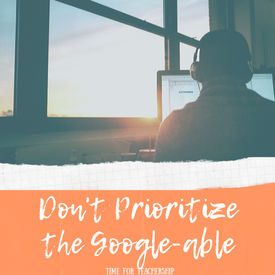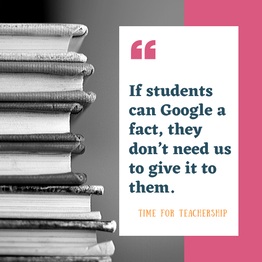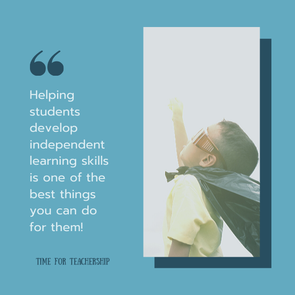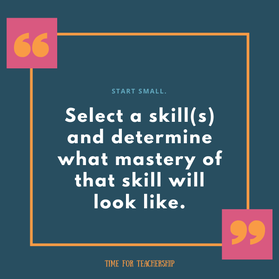|
Content is important! But, how students access content is going to impact how deeply they understand and contextualize it. The internet has changed students’ ability to access information, immediately. They will have the ability to do this as they go through life. If their job requires them to know a particular math formula, they can Google it. They can even find a YouTube video that teaches them how to use it. If students can Google a fact, they don’t need us to give it to them. What they will need is someone to teach them how to Google effectively, how to sift through information, determine what’s credible and relevant to the question they want to answer, how to ask the right questions from the start, and how to synthesize the information and apply it to a novel problem. They will need someone to teach them how to persevere when they get stuck, understand how they learn best, and identify what motivates them to learn more. They will need someone to re-teach or re-frame the content when they are struggling or to push them to go further when their application is mediocre and they could do better. I want to be clear: I am not saying content is irrelevant. Nor am I suggesting there are never times when you provide Google-able information in a lecture-style format. Content and (short, interactive) lectures certainly have value. What I am suggesting is to get out of the mindset that we need to race to cover a massive amount of content in one school year and instead, think about the handful of skills we want students to master in that one school year. From there, you can determine the key foundational concepts students must learn. It’s easier to plan this way because you won’t forget to build in content (you need it to contextualize the skill-building). However, it is easy to forget to build in the skills when using a content-first approach to planning. How is this better for students? The research highlights the importance of helping students become better learners. Teaching students how to integrate new content with existing knowledge has a .93 effect size on student learning, and teaching students how to transfer strategies across subject areas and activities has a .86 effect size (Hattie, 2018).. Helping students develop independent learning skills is one of the best things you can do for them! Furthermore, independent learning skills are critical for students’ success in their jobs and in their lives. It’s estimated that in 2020, only a month away, 50% of workers will be independent contractors and by 2030, 85% of the jobs that will exist have not yet been invented ("The Next Era of Human Machine Partnerships"). If students don’t know how to process new information and learn on the fly, they will likely not be able to survive economically. The job market is rapidly shifting, and we may need to make some adjustments to our way of teaching in order to prepare students to be successful in it. What could this even look like? New ELA curriculum from EL Education, which has already demonstrated its impact on student learning, provides a fantastic example of a curriculum focused on skills and going deep with less content. They have just four units per year, and they spend a lot of time building independent learning skills, habits of character, and deep content knowledge within the four selected topics. Additionally, the New York Performance Standards Consortium has an amazing track record of success with skills-based instruction and assessment. Here are the skill-based rubrics they use for each of the core subjects. Each subject’s rubric is used to assess every unit assignment from 9th-12th grade, and is just slightly scaffolded based on grade level expectations. Planning like this requires a shift in the question(s) you ask yourself. Instead of “What content will I cover today?” ask, “What will students do today?” How could I get started? This may be a drastic departure from your existing curriculum planning process. If it’s a big shift, you don’t need to make it all at once. Here are some options to get started...
Both of these approaches requires you to select a skill(s) and determine what mastery of that skill will look like. To help you out, here are two skill-based rubric templates. For the mastery-based rubric, I used a bike analogy to head each category (mastery level), but I’ve seen people use other creative analogies such as baking, Star Wars characters, and other subject-specific examples. Be as creative as you want. Have fun with it! I can’t wait to see your rubrics and hear how prioritizing independent learning and application skills over Google-able facts helps you with your planning. Once you give it a try, I want to hear from you. What roadblocks got in the way? What successes did you have? What questions are you grappling with? Post your questions or share your successes with the Time for Teachership facebook group. Asking questions in the group taps into the power of collective problem-solving, and when you share your wins, it inspires others to see what’s possible! Remember, real change takes time. Continue to think big, act brave, and be your best self. The results will come.
0 Comments
Leave a Reply. |
Details
For transcripts of episodes (and the option to search for terms in transcripts), click here!
Time for Teachership is now a proud member of the...AuthorLindsay Lyons (she/her) is an educational justice coach who works with teachers and school leaders to inspire educational innovation for racial and gender justice, design curricula grounded in student voice, and build capacity for shared leadership. Lindsay taught in NYC public schools, holds a PhD in Leadership and Change, and is the founder of the educational blog and podcast, Time for Teachership. Archives
May 2024
Categories |





 RSS Feed
RSS Feed